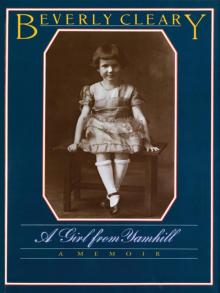- Home
- Beverly Cleary
Jean and Johnny Page 14
Jean and Johnny Read online
Page 14
“But that is not the point,” protested Elaine. “The point is that even if you know he doesn’t really want to go with you, or even if you don’t want to go with him, you should go so that you will be seen. Lots of girls would like to go with Johnny, and everybody knows it. And if you are seen at a school dance with him, everybody will think you rate. And maybe somebody else will ask you the next time.”
Perhaps Elaine was right. A girl never would have any fun if she did not make the most of whatever opportunities came her way. But Johnny as an opportunity had not really come Jean’s way. She had run after him. Jean wished she were not so uncertain about everything.
“Besides, you have a new dress,” Elaine pointed out practically. “And a pair of pumps with heels.”
“Yes, there is the dress,” agreed Jean. Her lovely plain dress with the shoes tinted to match the sash. Where would she ever wear them if she did not wear them to the dance?
“I think you are lucky,” said Elaine. “I don’t have anyone to ask at all. Oh, sure, I know some boys, but if I asked one of them to go to a dance with me he would probably run away screaming.”
“Oh, Elaine, don’t be silly,” said Jean.
“Maybe not screaming exactly,” admitted Elaine, “but he would probably be thinking like mad to make up an excuse. I couldn’t stand to see him suffer.”
“Oh, Elaine,” protested Jean, not wanting her friend, who had so many good qualities, to have such a low estimate of herself.
“It’s true. I don’t know a single boy who would like to go to a dance with me.” Whenever Elaine was gloomy she was thoroughly gloomy. “Oh, well, you know me. I always like to see the young people have a good time.” Elaine attempted to be jaunty about the whole thing. “You go to the dance and tell me about it.”
Laughing at Elaine raised Jean’s spirits sufficiently to enable her to decide, I will go. She would go and wear her dress and have what fun she could and after that she would never go out of her way for Johnny again.
“Anyway, things will be better next semester,” said Elaine, “because I have decided to learn to play the flute.”
“The flute!” Jean could not help laughing. Elaine did have some of the wildest ideas. “How will that help?”
“If I can play the flute I can play in the band,” said Elaine. “And the band is full of boys—a lot of them tall. And the band has a lot of fun. It even gets to go on trips sometimes. Maybe none of the boys will notice me, but at least I’ll belong to something and be doing something and not just wandering around like a lost soul dreaming about a television singer. Besides, a flute is easy to carry.”
“You know, Elaine,” said Jean, “I think you have something there. I haven’t felt so left out since I joined the Costume Club.”
Elaine whistled Yankee Doodle into an imaginary flute. “Weren’t we silly back in the days when we used to dream about Kip Laddish?” she asked, and both girls found this remark extremely funny.
On Monday, after school, Jean, who found that her change in attitude toward Johnny gave her a feeling of independence toward him, did not linger in her clothing classroom in the hope of meeting him on her way out of the building. She managed not to see him at all that day. On Tuesday afternoon he was waiting for her when she came out.
“Oh—hi,” said Jean, with more calm than she had ever felt before in speaking to Johnny.
“Hi, there,” Johnny answered, looking down at her with a disarming smile. “I’ve missed you.”
“Have you?” answered Jean with composure, while she thought, Have you really, Johnny, or are you just saying it? This new detachment toward Johnny gave her ego a tremendous boost. Who was Johnny Chessler anyway? Just a boy.
“Say…Jean,” Johnny hesitated, and then, leaning lazily against a locker, smiled down at her. “I know you aren’t going to believe what I am going to say.”
Jean returned his smile. “Probably not,” she said lightly. Even though her feelings toward him had changed, she still found him attractive.
“My grandmother is pretty sick,” said Johnny, “and I am not going to be able to go to the dance Saturday night. Dad says it wouldn’t be right for me to go when she is so sick, and all.”
Jean felt her face turn scarlet. Why, why hadn’t she broken the date first? Now no one would ever believe she had wanted to break it, even if she told anyone, which, of course, now she could never do. His grandmother! Jean was suddenly more angry than hurt, not because he was breaking the date, but because he was offering such a flimsy excuse.
“Anyone with your imagination should be able to think up a better excuse,” she told him.
“See?” said Johnny. “You don’t believe me, do you?”
“No, Johnny,” said Jean levelly. “I don’t believe you, but it is all right. You don’t have to go to the dance with me.”
Surprise flickered across Johnny’s face. He had expected Jean to show disappointment, to protest, perhaps to plead. That glimpse of surprise helped to support Jean’s pride. “And now I am going to tell you something you won’t believe,” she said, pleased with her unexpected poise. “I have been wanting to break the date with you.” She noted more than a flicker of surprise on Johnny’s face.
Johnny smiled his lazy smile. “How come?” he asked. “How come you have changed your mind?”
Jean looked Johnny straight in the eye. “Because I have thought it over and decided I don’t want to go with you because you don’t really want to go with me.”
“You have more spunk than I thought you had.” Johnny grinned, and ran the tip of his finger down Jean’s nose. “And you know something?” he drawled. “You’re cute when you’re mad.”
Oh! “I’m glad you think so,” answered Jean and, turning, walked away from Johnny with her head held high. Let him laugh if he wanted to. Johnny, she was sure, would not believe her, because it would be difficult for Johnny to believe any girl did not like him. Nevertheless, she felt better for speaking the words.
Jean hurried down the hall to Elaine’s locker.
“Why—hello.” Elaine sounded surprised. “I thought you would be waiting for Johnny.”
“I’m through waiting for Johnny,” answered Jean.
“You didn’t break the date after all?” asked Elaine, as she snapped shut the padlock of her locker.
“No, I didn’t break it,” said Jean. “Johnny did.”
Elaine turned to face Jean. “Oh, Jean! How awful.”
“It isn’t awful at all,” said Jean calmly. “You know I didn’t want to go with him. And now I don’t have to.”
“But to have him break it—” Elaine was so outraged she did not finish the sentence. “I mean, a girl has her pride. He can’t treat you that way.” Elaine scowled, and said urgently, “Jean, you’ve got to go to that dance. You’ve got to go and wear your dress, just to show Johnny! It is bound to get back to him that you went to the dance after all.”
Jean doubted this, but she felt herself infected by the intensity of Elaine’s feelings. “But who could I ask?”
“There must be somebody,” said Elaine. “Think. Think hard.”
“I’m thinking,” said Jean, “but it doesn’t help.” There was that boy in her English class who had been friendly, but he had already been asked, she knew. And a boy in math—no, she didn’t know him well enough and besides, she thought he was already going steady. And of course there were no boys at all in Clothing or in the Costume Club.
“What about one of the Indians from the variety show?” suggested Elaine.
“No,” said Jean. “There was such a bunch of them that I don’t remember any one especially.”
“Homer!” said Elaine triumphantly.
“Homer?” echoed Jean.
“He’s a boy and he knows you,” said Elaine.
“Yes, but—Homer. I never thought of him as a boy to dance with,” protested Jean.
“You can start,” Elaine informed her.
So Jean leaned back against a locker, he
r books clutched in her arms, and thought about Homer as a boy to take to a dance. It was not easy, because she had always thought of him as a boy who tagged around after Johnny. Or used to. Now that she thought about it, she had not seen them together lately.
“He’s not really homely, or anything like that,” Elaine pointed out. “And he shouldn’t mind your glasses, because he wears glasses himself. And he has nice manners. He isn’t anybody you would be ashamed to be seen with.”
“N-No,” said Jean. He was not anyone she was especially eager to be seen with, either. Still, there was nothing actually wrong with him now that she took the trouble to think about him. Perhaps the only thing wrong with Homer was that he was so easy not to think about. Like me, thought Jean. I am awfully easy for boys not to think about.
“Remember your dress and your high heels,” said Elaine, as if she were dangling bait in front of Jean.
Jean was tempted. “What if he has a date?”
“He won’t have,” said Elaine confidently. “Go on, Jean. Ask him for—for the sake of womanhood. You don’t want to be downtrodden by someone like Johnny, do you?”
Jean could not help laughing. “Oh, Elaine, the way you put things! All right. I’ll ask him for the sake of womanhood. The worst he can do is turn me down.”
“Good!” Elaine was jubilant. “You’d better ask him right away.”
“Before I lose my courage?” asked Jean.
“Partly,” admitted Elaine, “and because you can’t wait until the day of the dance to ask him. It wouldn’t look right.”
“Elaine, I can’t telephone him.” Jean did not think she could ever bring herself to telephone a boy again.
“Ask him the first thing in the morning and don’t change your mind.”
“I won’t.” Jean sounded less certain than her promise. Together the girls walked down the hall. Jean found it pleasant to be walking the familiar route with Elaine once more instead of lingering outside her Clothing classroom, hoping that Johnny’s whim might bring him toward her. She had never found any real pleasure in those uncertain moments, and now she wondered why she had waited at all. She felt as if she had suddenly been set free. As they passed the foot of the central stairs, both girls saw Homer descending from the library, a book in his hand.
“Here’s your chance,” whispered Elaine, and disappeared.
Here goes, thought Jean, glad that she would not have time to change her mind. “Hi, Homer,” she said when he had reached the bottom of the stairs.
“Hello, Jean,” Homer answered. He hesitated and then started to walk down the hall.
“Homer—could I talk to you a minute?” Jean asked nervously.
“Why sure, Jean.” Homer turned back.
“Homer—” Jean had to force herself to utter the words. “Homer, would you go to the Girls’ Association Dance with me?” The invitation was offered, and now the worst that could happen was his refusal. She could take it bravely if she had to.
“Why—” Homer’s face turned crimson.
Just the way mine does sometimes, thought Jean.
Homer’s face relaxed into a smile. “Why—sure, Jean,” he answered, looking flustered. “Gosh, that would be swell!”
“Swell,” said Jean, weak with relief.
“I mean—that would really be swell,” said Homer.
He honestly means it, thought Jean. How different was his reaction from Johnny’s…and how pleasant it was to watch. Jean and Homer looked at each other and this time Jean really observed him. He is a nice boy, she thought, and he has long eyelashes behind his glasses. She felt ashamed that she had not taken the trouble to look at him before.
“Golly, I never expected a girl to ask me to go to a dance,” Homer blurted out.
Jean was touched by Homer’s humility. Then she remembered Johnny, and wondered if Homer knew she had asked him first. If he did not already know, he was sure to hear it. Jean did not want this boy’s feelings to be hurt. She bit her lip for a moment while she decided that the best thing to do was to tell him herself. Right now.
“Uh…Homer,” she began. “I guess maybe I had better confess. I asked Johnny first and then he—he broke the date.”
If Homer was disappointed, he concealed his feelings from Jean. “That’s okay,” he said awkwardly. “I guess there are some fellows who just naturally get asked first.”
“I don’t suppose anybody will believe me, but I was sorry I had asked him and I really wanted to break the date myself,” Jean explained. “I mean, I am not heartbroken or anything like that because he broke the date.” Naturally a boy would not enjoy going to a dance with a girl whose heart was breaking over another boy.
“That Johnny!” was all Homer said.
“My mother will drive us,” said Jean. “I’m not old enough to get a license.”
“That’s all right. She doesn’t need to go to that trouble,” said Homer. “I can get our car.”
“Could you really?” asked Jean. It would be lots more fun to go in the boy’s car.
“Sure,” said Homer. “I’ll be glad to.”
Jean did not know what to do with the conversation next. Homer had accepted and he would supply the transportation. There seemed nothing more to discuss.
“I’m sure glad you asked me,” said Homer, “even if I wasn’t first.”
The wonderful part was, he meant it.
“Well, I have to go now,” said Jean. “I’ll probably see you before Friday.”
“Sure,” said Homer. “I’ll see you around school.”
As they parted Jean turned to watch this boy walk down the hall. There was no mistaking it. His walk was jauntier than she had ever seen it before. Elaine was by her side, seeming to appear from nowhere.
“What did you do?” asked Jean. “Disappear in a puff of smoke?”
“I went into the nearest room. I thought it was the right moment for me to tactfully disappear,” Elaine explained. “Did he say yes?”
“That’s right.” Jean looked thoughtfully at Homer, who was going out the door at the end of the hall.
“Hooray!” exclaimed Elaine. “That will show old Johnny.”
Jean wondered. Probably Johnny would not even know, because the activities of the Jeans and Homers were scarcely news around Northgate High. And if he did find out, she doubted very much that he would care.
“Tell me about it.” Elaine was always impatient for details. “He didn’t just say yes and walk off. What happened?”
“You know something, Elaine?” said Jean wonderingly. “He wants to go to the dance with me. He really does.”
“And now you can wear the dress!” Elaine sighed happily. “And the heels.”
“Yes, I can wear my dress,” said Jean dreamily. Maybe Homer wasn’t a boy she would have chosen to take to the dance if she had had the whole school to choose from, but he was a boy who really wanted to go with her. He was actually enthusiastic and wasn’t afraid to show it. Jean smiled to herself. Maybe Homer wasn’t the handsomest boy in school or the most popular. She didn’t care. He was a nice boy and he was eager, really eager to go to the dance with her. And that, Jean discovered, made up for a lot of things.
Chapter 10
Jean practiced wearing her brown linen pumps. She walked across the carpet, she walked on the bare floor. She danced forward, she danced backward, she whirled in circles, and all the while the phrase, “She walks in beauty,” whispered through her thoughts.
Mr. Jarrett rubbed the soles of Jean’s new shoes with sandpaper and, feeling more secure, she wore the shoes every possible moment until it was time to dress for the dance. Without her saddle shoes she felt light enough to float. It was a joy to slip into the new dress, now shortened to a becoming length, and have Sue pull up the long zipper for her. Carefully she knotted the brown-and-apricot sash.
“Your turn for the mirror,” said Sue, who had had first turn at the bathroom and who had now finished dressing. She and Kenneth were going to drive across the bay to see s
ome old movies that were part of a series called “The Development of the Motion Picture As an Art,” which was being shown at a museum. “You look darling and I hope you have a wonderful time with Homer.”
Jean smiled into the mirror at her sister, who seemed to shine with happiness tonight. “Thank you. And I don’t have to hope you will have a good time. I know you will.” She combed her bangs into place before she asked, “You really like Kenneth, don’t you?”
“Mm-hm,” answered Sue. “He’s—he’s just wonderful, that’s all.”
“I’m glad,” said Jean sincerely and wistfully. It would be so nice if she could feel that Homer was wonderful too.
The doorbell rang. “He’s here!” Sue snatched her coat from the closet, and was gone.
Jean enjoyed having the bedroom to herself. She fluffed the ends of her hair and admired her dress all over again. Johnny and the clerk in Northgate Apparel were right. She was attractive. It was funny, too, because she had the same brown hair and the same too-short nose that she had always had, and yet now she was different. She felt attractive. Maybe wearing glasses and being too short did not matter as much as she had believed. I am attractive, she told herself. I believe it now. But in the back of Jean’s mind lurked an unhappy thought. If she was attractive, why didn’t Johnny want to go to the dance with her?
“Jean, why don’t you come out and let us see how you look?” Mrs. Jarrett called from the living room.
Feeling suddenly shy in front of her mother and father, Jean made her entrance.
Mr. Jarrett whistled.
“You look lovely, dear,” said Mrs. Jarrett. “That dress is most becoming.”
“Thank you,” said Jean. It was comforting to know her family was proud of her.
“And I can tell you one thing,” said Mr. Jarrett. “That fellow Johnny is going to be sorry he changed his mind.”
“No danger,” said Jean. “He won’t be there.”
“Not that I ever thought he amounted to a hill of beans,” said Mr. Jarrett, as he reached into his pocket and pulled out his wallet. He took out two one-dollar bills and handed them to Jean. “Since this is a girls’ affair, you had better take this along. A boy gets pretty hungry dancing.”

 Ramona Quimby, Age 8
Ramona Quimby, Age 8 Dear Mr. Henshaw
Dear Mr. Henshaw Beezus and Ramona
Beezus and Ramona A Girl from Yamhill
A Girl from Yamhill Ramona Forever
Ramona Forever Jean and Johnny
Jean and Johnny The Luckiest Girl
The Luckiest Girl Emily's Runaway Imagination
Emily's Runaway Imagination Ribsy
Ribsy Ramona the Pest
Ramona the Pest Socks
Socks Ramona's World
Ramona's World Strider
Strider The Mouse and the Motorcycle
The Mouse and the Motorcycle Henry and the Paper Route
Henry and the Paper Route Ramona the Brave
Ramona the Brave Henry Huggins
Henry Huggins Ramona and Her Mother
Ramona and Her Mother Ralph S. Mouse
Ralph S. Mouse Sister of the Bride
Sister of the Bride Henry and the Clubhouse
Henry and the Clubhouse Muggie Maggie
Muggie Maggie Runaway Ralph
Runaway Ralph Ramona and Her Father
Ramona and Her Father Henry and Ribsy
Henry and Ribsy Henry and Beezus
Henry and Beezus Two Times the Fun
Two Times the Fun Fifteen
Fifteen Mitch and Amy
Mitch and Amy